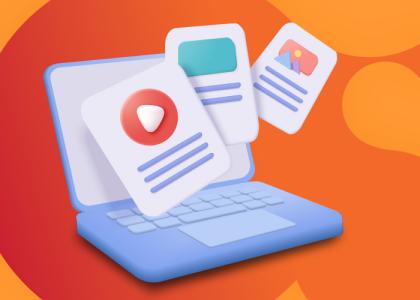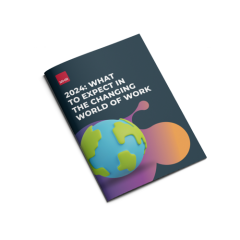What will learning be like in 2024?

As we move into 2024, learning and development (L&D) department will continue to take more flexible forms. Here's some of the biggest changes.
“Soft skills don’t change, people are people. Human behaviour is human behaviour. Maybe just the methods we use to bring those behaviours to the fore need to change.”- Julia Roberts, People Development, MHR.
Gone are the days where traditional face-to-face instructor led learning was seen as the default. eLearning has well and truly established itself, and even more kinds of learning are being offered to employees.
But there are more changes to come, as new challenges rear their heads.
80% of the workforce don’t sit behind a desk to do their job. So L&D departments can’t keep relying on the kinds of learning approaches that work for office-based employees.
73% of young people are anxious about their futures because of the cost-of-living crisis and feel like they’ve not had the same opportunities to develop in their careers as other colleagues, lowering their career expectations as a result. That’s a lot of untapped talent that isn’t being channelled.
And with more and more departments being asked to do more with less, how are L&D departments supposed to keep up with other more visible departments and ensure they get the funding they need?
So, what new shapes will learning take as we move into 2024?
Learning Experience, the next generation of learning?
A learning experience platform (LXP) is a new way of looking at learning, that’s regarded as an offshoot or evolution from a Learning Management System (LMS).
An LMS is what you’re most likely familiar with. These help ensure everyone in your organisation gets a baseline level of knowledge that’s consistent from employee to employee. Their focus is on what the employer needs.
An LXP is used to help employees' self-direct their own learning. It uses iterative development (including AI) to recommend content to users. This creates a more personalised learning journey for an employee, letting them take charge of their own development instead of waiting to be told to do things.
It’s a lot like how customer service has expanded to customer experience, LXP represents an evolution of what already exists. It’s an expanded perspective on what L&D can be.
“LXP is starting to become a more known term, as well as a new priority to the mainstream,” says Ian Mackinnon, Senior Learning Product Manager at MHR, “It will likely become a big thing going into next year.”
Katrin Shaw, Founder, Go!Fish Collective says, “Providing true learning experiences, where everyone has control over their own learning paths, will bring out better performance and keep great people in the company. It will create a culture of learning and exchanging knowledge, skills, and best practices.”
Upskill for the future
“Who better to talk about the latest skill than the employees that are demonstrating this day to day?” Ian Mackinnon.
PWC’s workforce of the future report found 74% of workers want to develop their skills to remain employable.
Skill sets for jobs have changed by 25% since 2015. By 2027, this number is expected to double. Shifting technologies means that new skillsets are constantly in demand. That means skill gaps are plaguing organisations up and down the country – Finance teams in particular are suffering as a result of skill gaps, because they often lack soft skills revolving around leadership and workload management.
Skills change at a pace faster than traditional L&D approaches can keep up with. As a result, it’s really important that L&D departments collaborate closely with employees and managers to understand what skills are currently needed and what will be needed in the future.
This will be especially important for industries where AI could be quite disruptive. By training people up on soft skills and leadership skills, you give employees the ability to supplement AI use without being overpowered by it.
Want to learn more?
Learning is always growing and changing, and we’ve only scratched the surface in this blog. If you want more details, download our full guide below. It covers even more, including the importance of investing into learning and development even in economically challenging times, and how upskilling is changing.
This blog is part of a wider six part series, all about the challenges and opportunities the changing world of work will have to deal with in the coming year.
We’ll help you build your full 2024 roadmap, covering HR, payroll, finance, learning, data analytics and tech.



